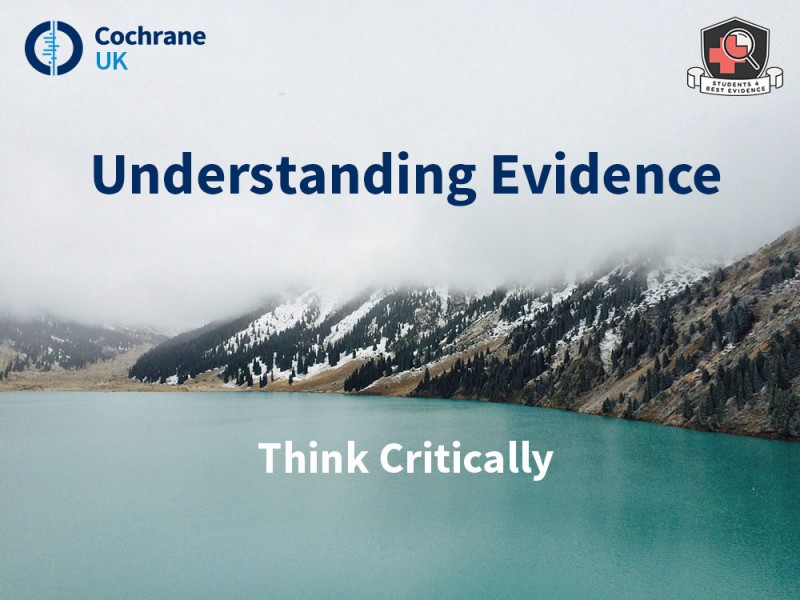
We all need to be able to make sense of evidence, whether we’re making decisions about treatments, or weighing up the latest health story to hit the headlines. In partnership with Students 4 Best Evidence, we are putting the spotlight on common errors and misunderstandings with our new occassional series, Understanding Evidence.
We want to bring together the ideas that underpin the way we think about evidence. We want to share resources and initiatives that can help with making sense of evidence, and we want to highlight opportunities to get involved with others with an interest in evidence.
Understanding Evidence launched with a special week of blogs in 2016. Thereafter, there are occasional blogs and content, all curated by us and our partners using #UnderstandingEvidence. Please join us on social media, share your ideas, and help us make sure that we challenge claims and think critically.
Blogs
Oh Really? 12 things to help you question health claims
- “Oh, really?” 12 things to help you question health advice by Selena Ryan-Vig
- Expert opinion is not always right by Martin Burton
- All that glisters is not gold: are new, brand-named, high-tech, expensive treatments always better than old ones? by Rob Walton
- Treatments can harm by Selena Ryan-Vig
- Teapots and unicorns: absence of evidence is not evidence of absence by Lynda Ware
Questioning evidence and looking behind the headlines
- Health advice in the media: how do we know what to believe? by Lynda Ware
- Behind the headlines: can one in three dementia cases be prevented? by Kirsty Marais
- Cocoa and blood pressure: food for thought by Selena Ryan-Vig
- Understanding evidence: Cochrane UK’s new series by Martin Burton
- An invisible unicorn has been grazing in my office for a month… Prove me wrong. by Martin Burton
- An incomplete and misleading reading of Archie Cochrane by Iain Chalmers
Evidence in practice
- Everyday practice: tried, trusted and tested? Here’s why we need evidence by Sarah Chapman
- Should the Cochrane logo be accompanied by a health warning? by Iain Chalmers
- Unthinkable thoughts and evidence by Richard Lehman
- Cochrane evidence on catheter washouts: from Twitter to the bedside by Teresa Chinn
- Being patient with EBM. “Just because we can, doesn’t mean we should” – supporting informed decision-making by Sarah Chapman and Kitt Byatt
- From acupuncture to vitamin D: engaging the experts when the evidence is equivocal by Helen Cowan
- Getting clinical guidelines into practice – what works best? by Rob Walton
Learning about, and engaging with, evidence
- Evidence-Based Medicine: spreading the word by Lynda Ware
- Teaching evidence-based medicine (EBM) in schools by Lynda Ware and Selena Ryan-Vig
- Teaching kids to assess goopy health claims by Matt Oxman
- Schools Teaching Awareness of Randomised Trials (START). Can understanding trials really be child’s play? by Sandra Galvin and Shuan Treweek
- Evidence flowers: visual summaries of evidence for patients and health professionals by Opeyemi Babatude
- Meet the Cochrane Trainees and engage in evidence! by Cochrane Trainees
- Cochrane Crowd for students: what’s in it for you? by Emily Steele and Anna Noel-Storr
- Key concepts for assessing treatment claims by Emma Carter and Selena Ryan-Vig
- Students 4 Best Evidence: new kids on the blog by Selena Ryan-Vig
- Children can do randomised trials! START competition 2019 by Sarah Chapman
- The People’s Trial: your chance to be a scientist in a fun online trial by Sarah Chapman
- Writing a Cochrane Review: my experiences of a diagnostic test accuracy review by Lucy Beishon
Read all the blogs from the series on Evidently Cochrane
Blogshots
Find all the blogshots from the series stored in our blogshot archive here
Hashtag
Please share blogs and blogshots from this series using #UnderstandingEvidence and don't forgot to tag us @CochraneUK
